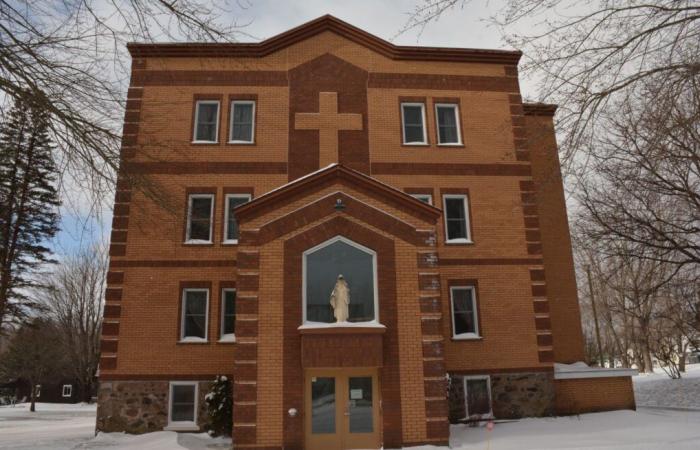The future of the former Sutton convent – and the park behind it – finds itself before the courts. The municipality is trying to obtain management of the heritage building left vacant in 2023. The historic administrators instead wish to convert it into accommodation for helping women with drug addiction, which is, according to them, the vocation which is in line with the mission of the nuns who once resided there. The dialogue of the deaf could be resolved in the coming weeks.
Ladybug corpses on the stairs demonstrate that, even if the building is well maintained, time takes its toll. The building is currently spending its second winter without any souls living there. “That’s it, an unoccupied building,” underlines Victor Marchand, who tours the owner.
He chairs what remains of the board of directors from previous administrations. “La Villa”, as it is called here, was first a residence for nuns from 1911. They taught all kinds of courses to the citizens of the place, before the place was converted into a “Foyer de charity” around 1971. Under the authority of the Catholic Church, spiritual retreats were held there until 2023. The ecclesiastical authorities decreed that year that they would not no longer intended to use the place for their faith. “It is not up to the Church to pose as judge and choose […] which project is best suited [à la communauté de Sutton] », wrote the papal delegate that year in an official letter. The debate on the new vocation of this place full of woodwork, stained glass and old junk has since turned sour.
The Town of Sutton wants the building and adjacent land to return to its fold. The mayor, Robert Benoît, dreams of transforming it into a “community center” and claims the right of pre-emption to prevent any further transfer to other organizations. The diocese of Saint-Hyacinthe, with the support of the mayor and in contradiction with the papal decree, is suing the administrators to force them to “liquidate” the Villa, claiming that they no longer have anything to do there since the departure of the roomers of the “Foyer de la Charité”. This complaint from the diocese invokes in particular “the canonical statutes” of the place and repeatedly criticizes the “free transfer” to a future new occupant.
Victor Marchand sees the future of this magnificent religious heritage in a different light. “We don’t want to make money from this, the rest of us,” he said several times. Instead, he wants an organization that helps marginalized women, the “La Passerelle” organization, to set up there. Its council in turn went to court to slow down the expropriation notice and, above all, to force the hand of the municipality so that it issues a certificate of occupancy, the key to reconversion.
Legal proceedings continue to be postponed. A next hearing is scheduled for January. “We should hit a knot in April,” warns Mr. Marchand, because the insurance companies will come knocking to find out how the house with around forty rooms, the 8 pavilions surrounding it and the 9 hectares of land will be able to survive a third winter. empty.
Retraining proposed
In the heights of the meadow behind the presbytery, the view is magnificent. Citizens walk with their dogs, hike or practice cross-country skiing, with the Sutton Mountains as a backdrop.
“That’s what’s impregnable. That’s what’s worth a lot,” says Victor Marchand.
He planted hundreds of black walnut trees here last summer, a way for him to ensure that no real estate developer will be able to dream of condos on this land. “Here, it’s “zoned white”, residential. The seeds can come in tomorrow morning. We would like to return it to “zoned green”. Agricultural. »
Otherwise, everything here has been frozen since the departure of the former tenants. A maple grove with a thousand taps, abandoned for two years, is waiting to return to service. The garage is still full of working tools. In a corner of the washhouse with washers and dryers in good condition, spools of multi-colored thread are ready to be used. That this place becomes a women’s shelter again makes sense, argues Josée Barrette, a committed citizen who contacted The Duty for this report. “Can you imagine all the learning possibilities so they can get out of their misfortune? »
The mayor has repeatedly expressed his desire to transform the premises into a community center. He declined our interview request claiming that the debate was before the courts. However, a new multifunctional and community room has just opened in the old Olivet church under the name “house of generations”, replies Victor Marchand. And then, the spartan rooms, common kitchens and outbuildings seem ill-suited to a different reconversion, according to him. One of the pavilions is already used by the ping-pong club, and it could remain open to all.
Neighborhood problem
Two heiresses of Eugène Dyre, the patron who allowed the erection of the convent, also claim “a right of veto” over the legacy of their great-grandfather. Victor Marchand says he does not understand this refusal to accept a new “charitable” vocation, especially since “La Passerelle” responds as much to the spirit of the place as to the wishes of their ancestor.
The latter wished in his will that the convent maintain an educational vocation. Over the years, alcoholic priests have been treated within its walls, of which the women have always been mistresses.
The community organization that covets the convent constitutes the only long-term accommodation resource for women with drug addiction problems in Quebec. Their building in Saint-Simon, a village in Montérégie, has become cramped as needs have increased in recent years. “La Passerelle has 113 women per year, including 45 with a criminal record,” calculates its general director, Amélie Lemieux. “Women’s crime is different from that of men. These are survival crimes, prostitution, theft or drunk driving. These are not major crimes or crimes against the person. »
“We understand that it can be scary. […] The clientele, when they arrive at the resource, they are not in withdrawal. Weaning is experienced elsewhere,” she adds. “We have been in a village surrounded by single-family houses for 20 years. No deplorable incident occurred. They are not allowed to leave the field. It’s not an open environment. »
The organization says it refuses two women per day. These needs are closer than we might think, finally confides Victor Marchand as he leaves. “A mother from Sutton asked me to reserve a place for her daughter…”






